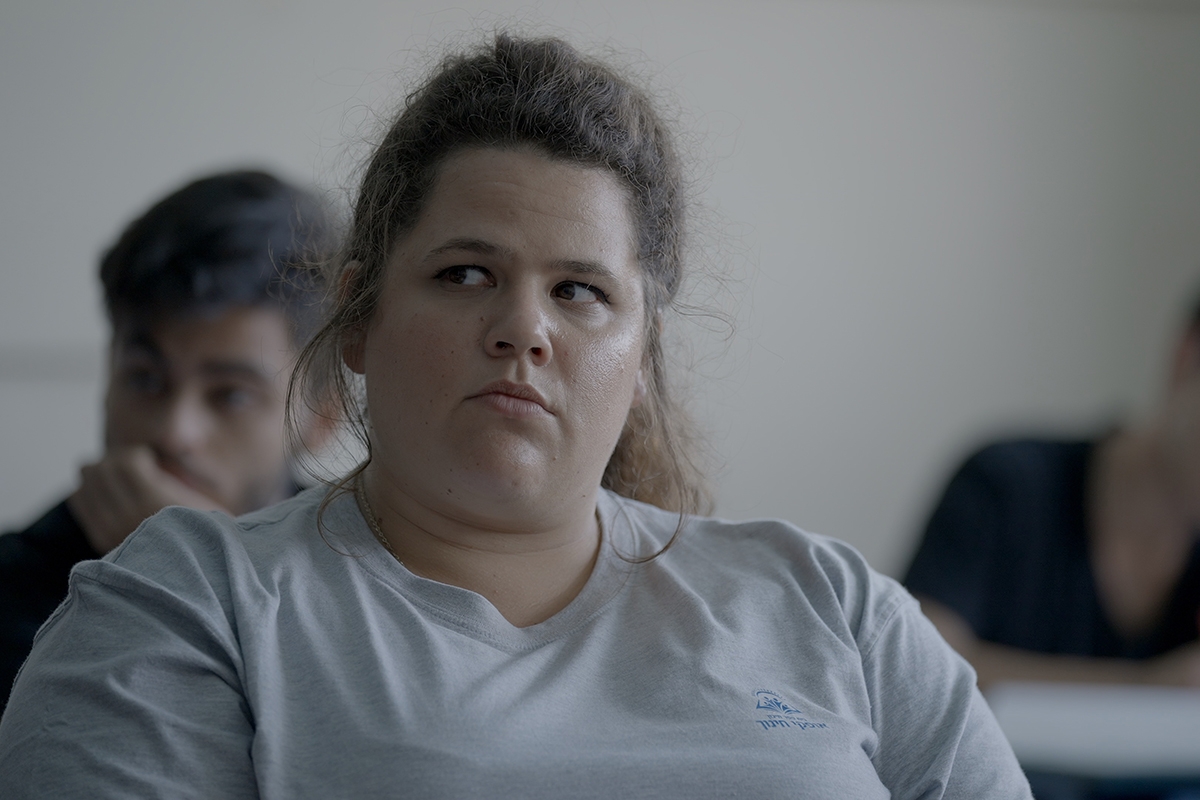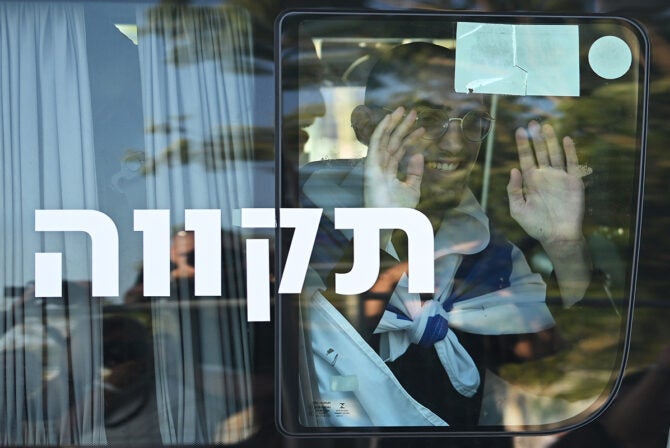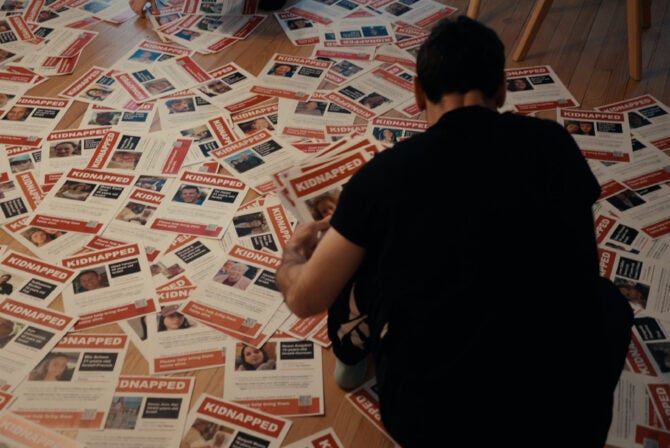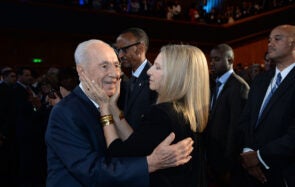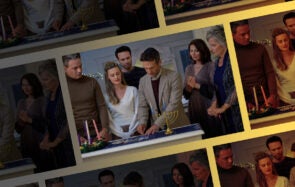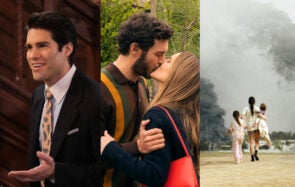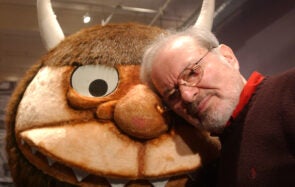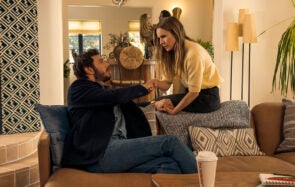Maya Landsman, 30, is truly a meteoric kind of talent. She performs humor and tragedy with a singular resolve and earnestness on both stage and screen. She won an Israeli Academy Award for her role in the army dramedy “HaMefakedet.” She plays in the delightful comedy “Checkout.” And she’s a rising theater star in the show “Rehearsals,” a show that imitates life, because in Israel, Landsman is also a sensation on stage.
In “The Lesson,” now streaming on ChaiFlicks, she takes on a complex character that’s easy to spurn — someone who espouses racist sentiments, who acts selfishly — and makes her feel wholly human and relatable. It’s a role that won her both an Israeli Academy Award and a Canneseries award for best actress.
The show tells the story of civics teacher Amir, played by “Fauda” star Doron Ben-David, and his student Lianne, played by Landsman, who are stuck in an ideological battle that started when Lianne argues in class for banning Arabs from her local public pool.
The final scene of the drama is a heart-wrenching moment of TV, almost too hard to watch for its heightened emotional decibels. The classroom brawl of the minds turns out to have terrible, possibly deadly consequences, involving Lianne’s boyfriend, Asi, who drives off to possibly commit a terrible act at a checkpoint.
Showrunner and writer Deakla Keydar and Eitan Tzur weren’t sure how the denouement of the show would play out — a moment in which Amir and Lianne drive together into that terrible scene, not knowing what Asi has done, but hearing sirens blare. On the day of the shoot, Keydar and Tzur put it to the show’s stars, asking, “How do you think this scene should go?”
Landsman was instantly transported to the day of her mother’s 50th birthday party, over a decade earlier, when Landsman was just 17 — like her “The Lesson” character — when her father collapsed of a heart attack and died. She then had the serendipitous realization that the day of the shoot was her mother’s birthday, and the anniversary of her father’s death.
During the scene, as Landsman relived the feelings and motions of the darkest night of her life in that dimly-lit night shoot, pacing and barely breathing, Doron leaned in and hugged her — part improvisational acting, part an act of human comfort. The hug had been removed from the original script because it felt so schmaltzy, so contrived. And then, there it was, so incredibly rooted in the moment.
“We looked at the monitor, we looked at each other, and you could not believe that it happened, that he just hugged her,” Keydar recalls.
“It looked so real. And I think because Maya got into this special, very, very special and specific mode, because of the story she told us, our hearts broke for her. And that made Doron be like a parent. And that was what we wished [for Amir] in the series as well… to finally act as a grown-up, as a parent, as a responsible father,” Keydar says.
“You can understand how amazing she is, how open she is, and how genuine and honest and smart she is,” Keydar says about her lead actress, “because it takes a lot of courage to really expose yourself emotionally.”
When I speak to Landsman on a recent summer afternoon, I experience that openness and genuine candor, too. She’s not at all cautious around political topics many Israelis might carefully hedge their words on. Instead, she wonders aloud, questioning things.
“I’m so confused,” she says of the current Israeli political sphere. “I believe in freedom. I believe in anti-racism. I believe that every person needs to feel home in every territory,” Landsman tells me. “I love the country. I’m Jewish. My grandmother was in the Holocaust, my grandfather built Bnei Brak, my father came from Argentina to make aliyah to Israel. But also I see the reality. I see the conflict. And I’m so confused in my identity.”
It’s clear her political leanings are nothing like her character, Lianne’s, which she found a fun escape to take on. “It was very liberating to play someone that has her opinion. Sometimes to be extremist — it’s freeing.”
Just like Lianne, Landsman felt like a “messy girl” in high school, and she was drawn to the army, a place that would give her routine and discipline.
There are other reasons why Lianne feels like a uniquely drawn character: Shows about high school students rarely have a protagonist who’s fat. (A rare exception is “My Mad Fat Diary,” which, I would argue, remains one of the best TV fat representation, starring Scottish actress Sharon Rooney who you can now see in the “Barbie” movie.) Fat students are usually the comic relief or the bully. And Lianne certainly feels like the bully at times, and yet through Landsman she feels no more cruel than the average misguided high school student. Her insecurities are front and center in a system, both educational and familial, that fails her and puts her in constant survival mode. She lives in a body that puts her on the defense constantly — from clothes that are ill-fitting, to her mother’s intense food judgement, and even from Amir, who, at a moment of weakness, tries to attack her body, asking how she would feel if fat people were banned from the pool.
Just like in America, Israeli society is pretty fatphobic — but there are also a smattering of incredible stars who have worked to change that. Landsman feels that that is her cross to bear, happily, because she knows how much seeing her on screen can be inspiring for younger people. But she’s also an idealist; she hopes for a world in which interviews won’t ask her about how rare her body is in the landscape of TV.
“I think we’re going, slowly but surely, to a very good place where everyone is beautiful,” she says.
As a character, Lianne isn’t defined by her body, but so many moments of her discomfort in her body are so intimately relatable for anyone who has struggled with body image in high school — from trying to stretch out a shirt that fits too tightly to body checking and comparing yourself to other bodies (“I’m not as fat as her,” she says, after seeing another bigger bodied person) to feeling weary and unworthy of romance.
It’s in that last category, though, that Landsman got to have a sort of healing experience. She got the boy and a beautiful, if not somewhat problematic, romance.
“When I was in high school, I always loved the hot boys, the handsome boys, the surfers. I wanted all the boys that there was no chance they would look at me. And then in the series, in the end, I’m with Asi, the hot, the handsome guy. And I told Deakla, I made it.”
Landsman’s father is still her north star, all these years after his passing. She calls him a “very pure soul,” wistfully speaks of the great food that he made, his humor, his mellifluous accent, and what he taught her about being Israeli.
“When I was 10 years old, he gave me a map of Israel. He showed me the map and he told me, ‘There is a problem here. There are the Arabs, another people. They want to live here. But the Jews, they say that they were here before — they say that it’s written in the Bible.'” He asked her, what would you do in this situation, instead of telling her what to think.
“I saw my father go to vote,” she recalls. “I asked him who did you vote [for]? And he told me, ‘I’m not telling you because I don’t want to brainwash you. You will have your journey, you will do what you want.'”
Just like in “The Lesson,” classrooms are becoming battlefronts in the U.S., with book bans and censorship on the rise. But Landsman believes that classrooms and schools are a place where one can learn how to see the world — it’s an experience she had with her principal, Ram Cohen, who organized political debates at the school and helped Maya find her way.
Landsman says that she wants “teachers to be brave,” just like her former principal. “Not to say their opinion — that’s not what it’s about, but to expose students to many, many, many situations in the world. Then they will choose what to believe.”
“It’s not about opinions. It’s not about sides. It’s about [the fact] that everybody wants to live life in health and security.”
As for Landsman, she feels like she has her own advocacy to do. “My problem is the fat problem. My goal is to put myself in the forefront and to show others, girls and boys and everybody, [that] every presentation is beautiful and interesting.”
